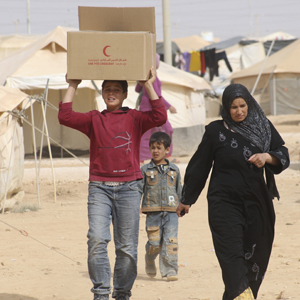
Boys play football amid the civil war wreckage in Homs, a city that has been in the center of the fighting for almost 20 months. Photo: Reuters
Concern About Broader Autonomy Undermines Support for Uprising
Kurdish reluctance is frustrating efforts by opponents of Syrian President Bashar al-Assad to form some kind of transitional administration that could win support from foreign governments.
Syrian Kurds have walked out on several attempts to form a unified opposition, complaining that expatriate politicians don’t adequately recognize their status as a people, or their long-standing demands for autonomy. Some opposition leaders are saying the Kurds won’t sufficiently commit to a unified post-Assad Syria.
“It is absolutely the case that the relationship between the mainstream opposition in exile and Syria’s Kurds has been largely antagonistic and very, very tense,” says Steve Heydemann, senior advisor for Middle East Initiatives at the U.S. Institute of Peace. “That gets back to the question of this mutual lack of trust.”
President Assad moved to encourage that mistrust early in the 20-month-old Syrian conflict by granting Kurdish communities greater political freedoms.
“This really put them on their heels,” says Cato Institute Middle East analyst Malou Innocent. “They said: ‘Well, should we continue our assistance to the rebellion or should we actually stick this out and see if Assad continues to hold onto power?’ They are in the middle.”
A Decisive Minority
Innocent says Kurds are Syria’s “decisive minority, and they have been on the fence.”
Heydemann credits Kurdish leaders for largely resisting President Assad’s bid to secure their loyalty. But on the other hand, he says, “they have also resisted efforts by the opposition leadership to draw the Syrian Kurdish community firmly onto the side of the revolution.”
Kurdish misgivings over the composition of Syria’s political opposition create gaps that Heydemann says “remain very, very large. Efforts have continued to try to bridge those gaps, but they haven’t made a great deal of progress.”
Chief among the so-called “Friends of Syria” trying to bridge the gaps is the United States.
State Department spokeswoman Victoria Nuland says the Obama administration has repeatedly stressed the need to see “all of the groups in Syria working together on a future that provides a place for Syrians of all different stripes, whether they are Alawi, Sunni, Kurd, Druze, Christians — whomever they are.
“So from that perspective,” Nuland said, “we have consistently encouraged the opposition groups to incorporate the Kurdish opposition as well.”
Nuland says some Kurds are cooperating with the opposition Syrian National Congress.
“There are also a number of reports from inside Syria of some of the liberated areas where Kurdish populations and Sunni populations are working well together,” she says. “That’s certainly the direction that we encourage for the Syria that emerges from this — to be representative of all and welcoming of all.”
 Concerns in Washington
Concerns in Washington
But Washington remains mindful of the ties between Syria’s largest Kurdish political group — the Democratic Unity Party, or PYD — and the Kurdistan Worker’s Party, or PKK, that the European Union and the United States both consider a terrorist group.
“The Turkish government has been very explicit in stating that if they perceived any direct effort by the PYD to engage in anti-Turkish activities, especially across the border, that they would respond very forcefully,” Heydemann says.
“So the components are there for some significant tensions to emerge as the Kurds try to exploit this opportunity of the uprising to advance some long term relationships and use their connections to other regional communities as a bargaining chip in doing so.”

Tens of thousands of Syrians fleeing the civil war violence have taken refuge in neighboring nations. Shown here is a refugee family in the Al Zaatri camp near Mafraq, Jordan, Oct. 24, 2012. Photo: Reuters
Heydemann says some Syrian Kurds are receiving military training in Iraqi Kurdistan, where he says there is also political consultation about the best bargaining positions.
“I don’t think they intend to play the regime against the opposition,” he says. “But they do feel that they have an opportunity to use this moment to try and advance some of their long-standing concerns that they don’t feel either side has really responded to yet.”
Malou Innocent believes many Kurds have still not decided where their loyalties should be placed.
“They don’t know how this will pan out,” she says. “Especially when we see the FSA, the Free Syrian Army. They do have light weapons. They have been somewhat effective. But they are still up against a very capable Syrian army, one of the strongest militaries in the region.”
With the fighting in northern Syria driving more than 100,000 refugees into Turkey and Iraq, it’s especially important to have Kurdish participation at upcoming talks in Doha toward an opposition “leadership council.”
U.S. Secretary of State Hillary Clinton says the idea is to create a “leadership structure that endorses inclusion, democratic process, peaceful political transition, and reassure all Syrians, particularly those who are in minority groups, that there is a path forward if everyone supports it.”


4 responses to “Kurds the Key for Syrian Opposition”
[…] of America: Kurds the Key for Syrian Opposition Concern About Broader Autonomy Undermines Support for […]
Kurds in Syria should be granted democratic right to decide (Kurds, not anybody else) whether to stay within the Syria in a federal system or to be an independent state …
It would be physically, economically and administratively impossible for the Kurds to have an independent State. Lesotho would be an example of what happens to tiny independent States. It’s not very plausible to expect Syrian or Iraqi Kurds to align themselves with an opposition which is in large part funded by Turkish Sunni interests.
The USA has plenty of problems at home. Syria should be last on the list for USA resources right now. Until the USA led “intervention” in Syria, it was a beautiful country with less poverty than the United States.